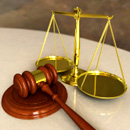| From the moment the International Criminal Court opened its annual two-week meeting, its credibility was being put to the test because of its failure to start prosecuting two Sudanese charged with crimes against humanity in conflict-wracked Darfur. Sudan on Friday reiterated its refusal to hand them over for trial, and experts say much depends on the strength of U.N. Secretary-General Ban Ki-moon's message on Monday to representatives of the 105 nations that have signed on to the court, the world's first permanent war crimes tribunal. "It will be imperative that he speak in strong, unambiguous terms as to his support for this court and for this court's arrest warrants," Richard Dicker, director of the international justice program at Human Rights Watch, said Friday. Without a tough message from Ban, the Sudanese government may get the idea they "can flout this court at will without facing repercussions from the leadership of the United Nations," Dicker said. "If that were to happen, it would make more difficult the prospect of justice for victims for absolutely horrific crimes." The court came into being in July 2002, but Sudan is not among the 105 countries that have endorsed the 1998 Rome treaty that established it. The Security Council referred the Darfur case — charging a cabinet minister and a janjaweed chief with crimes against humanity — to the court in 2005 in a resolution that required Sudan's government and all other parties in the conflict to cooperate. Sudan later agreed to set up its own investigation and a special court for Darfur. In his speech Monday, Ban is expected to "urge all member states to do everything within their powers to assist the court in enforcing the outstanding warrants" in Darfur and to praise the court for becoming "a centerpiece of our system of international criminal justice," said associate U.N. spokesman Yves Sorokobi. The conflict in Sudan's western Darfur region has claimed over 200,000 lives and uprooted 2.5 million people from their homes since violence erupted in early 2003 when rebels from the ethnic African majority took up arms against the Arab-dominated government. Critics accuse Sudan of retaliating by arming local Arab militias known as the janjaweed, and the government is blamed for widespread atrocities against civilians. The court's meeting opened Friday with tough words from its president and its chief prosecutor on bringing charges against Ahmed Muhammed Harun, who was appointed Sudan's humanitarian affairs minister after his indictment was announced, and Ali Kushayb, a janjaweed leader. "The arrest warrants and the obligation to enforce them will not go away," Luis Moreno-Ocampo, the chief prosecutor, told the meeting. Judge Philippe Kirsch, the court's president, noted the potential impact on the court's credibility because the warrants it issued in early May for the arrest and surrender of the two suspects have not yet been executed. "Without arrests, there can be no trials. Without trials, victims will again be denied justice. The potential deterrent effect of the court will be reduced," Kirsch told the meeting. Kirsch told the meeting that Ban's anticipated presence on Monday "reaffirms the importance of this special relationship" between the U.N. and the court, which is a tribunal of last resort for war crimes, genocide and crimes against humanity. "The strength of support we receive during this meeting from the states and the United Nations, of course, strengthens the credibility of the court," Jurg Lauber, the court's chief of staff, told The Associated Press. Sudan's U.N. ambassador, Abdalmahmood Abdalhaleem Mohamad, told the AP on Friday that because Sudan is not a party to the court, its jurisdiction does not apply and its prosecutor was making "impossible demands, acting on behalf of the enemies of the peace and stability in the country." Mohamad said Sudan also "should not be subject to the politicization of the Security Council." Will Sudan turn over the two people indicted by the court? "We will never turn over our citizens to be tried abroad," Mohamad said. "If there are accusations against any of our citizens, the judiciary in Sudan is more than capable." |





